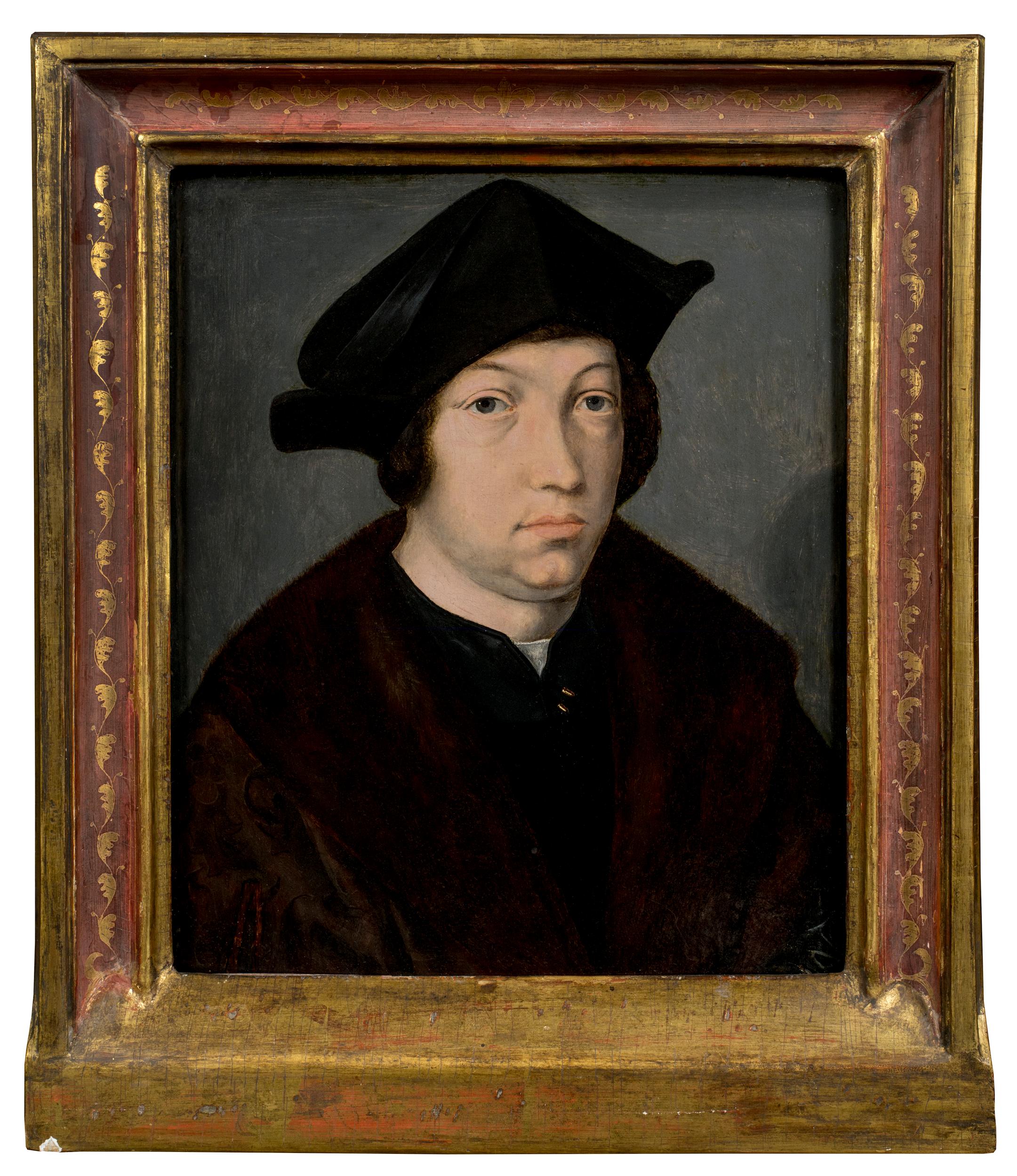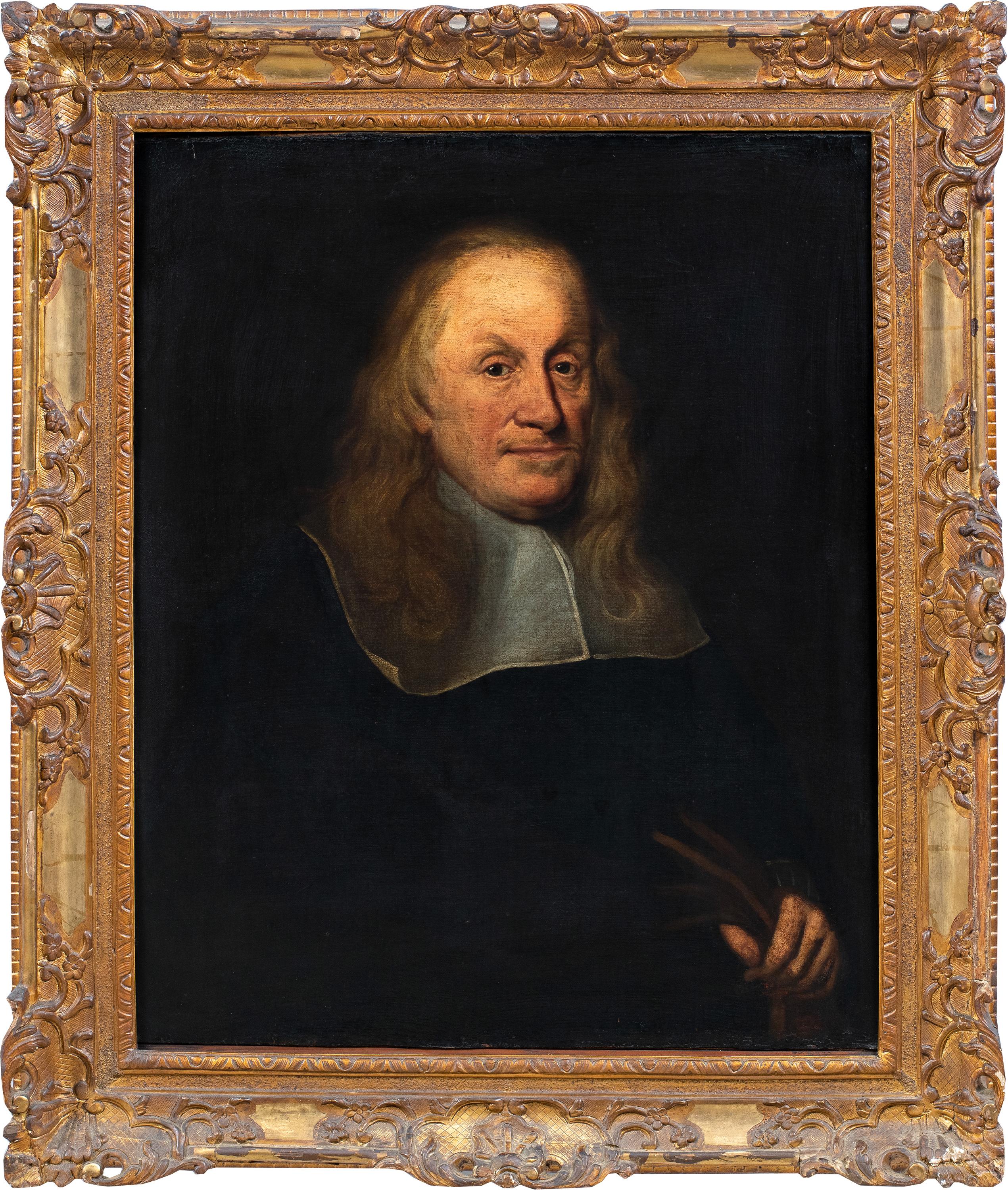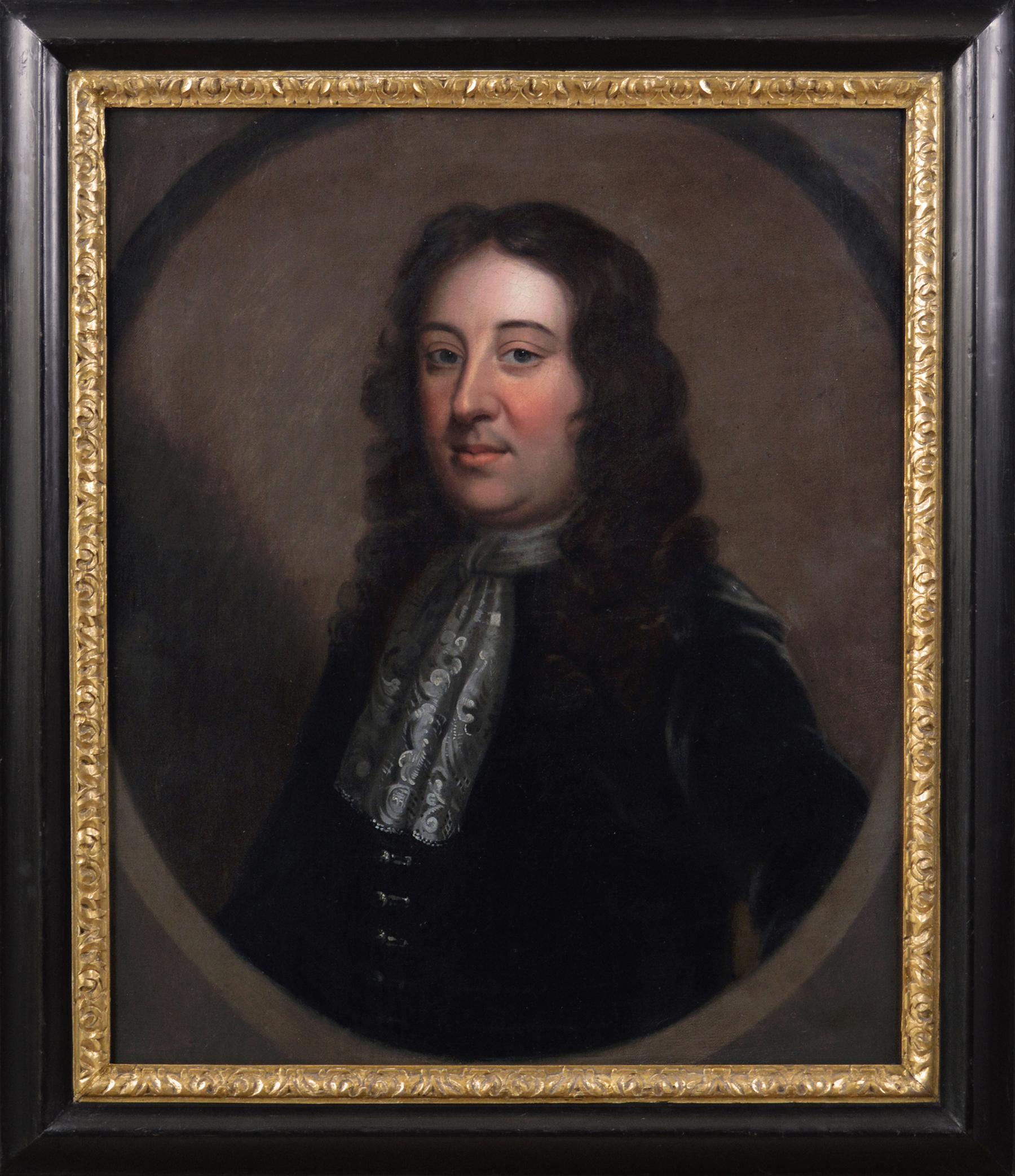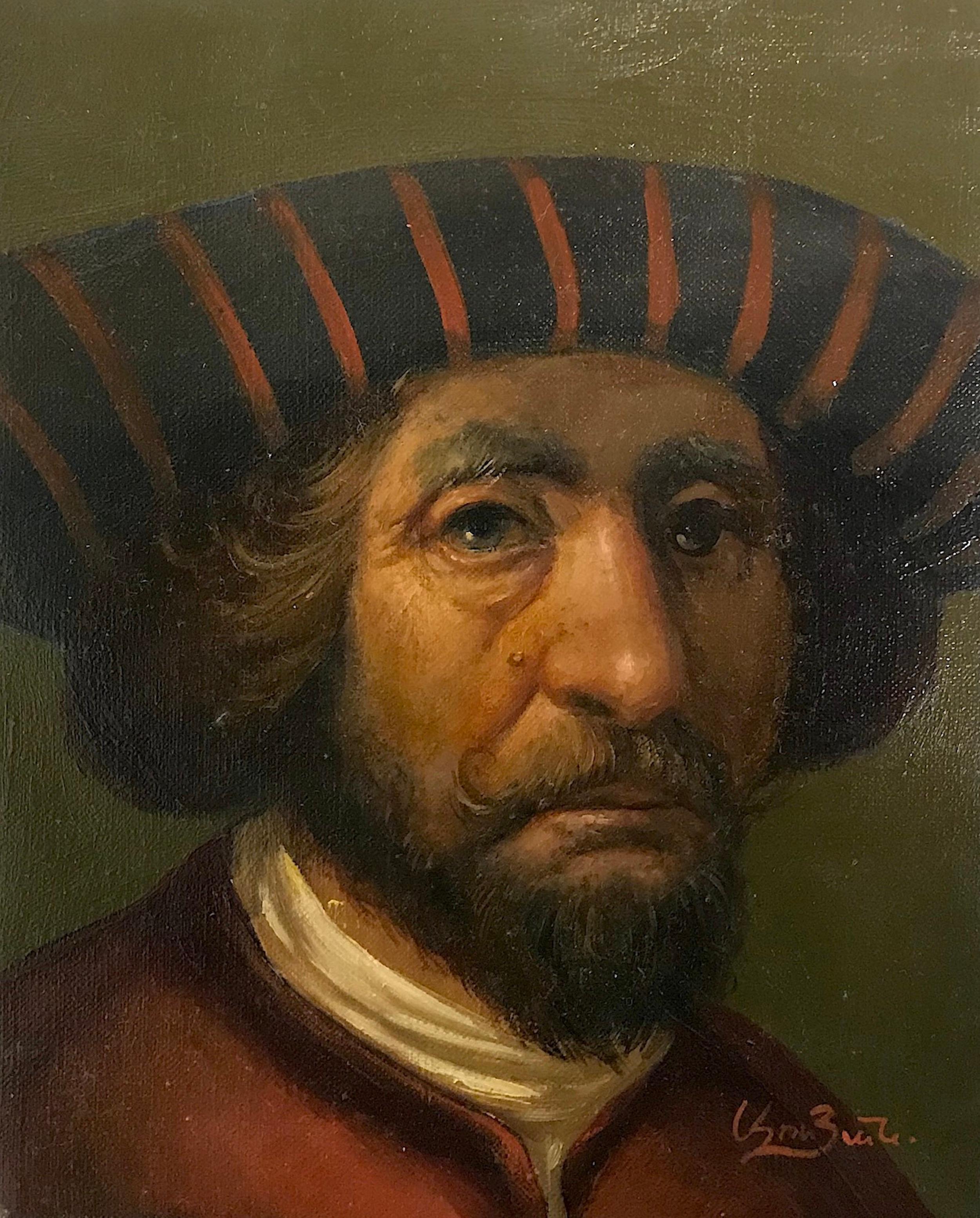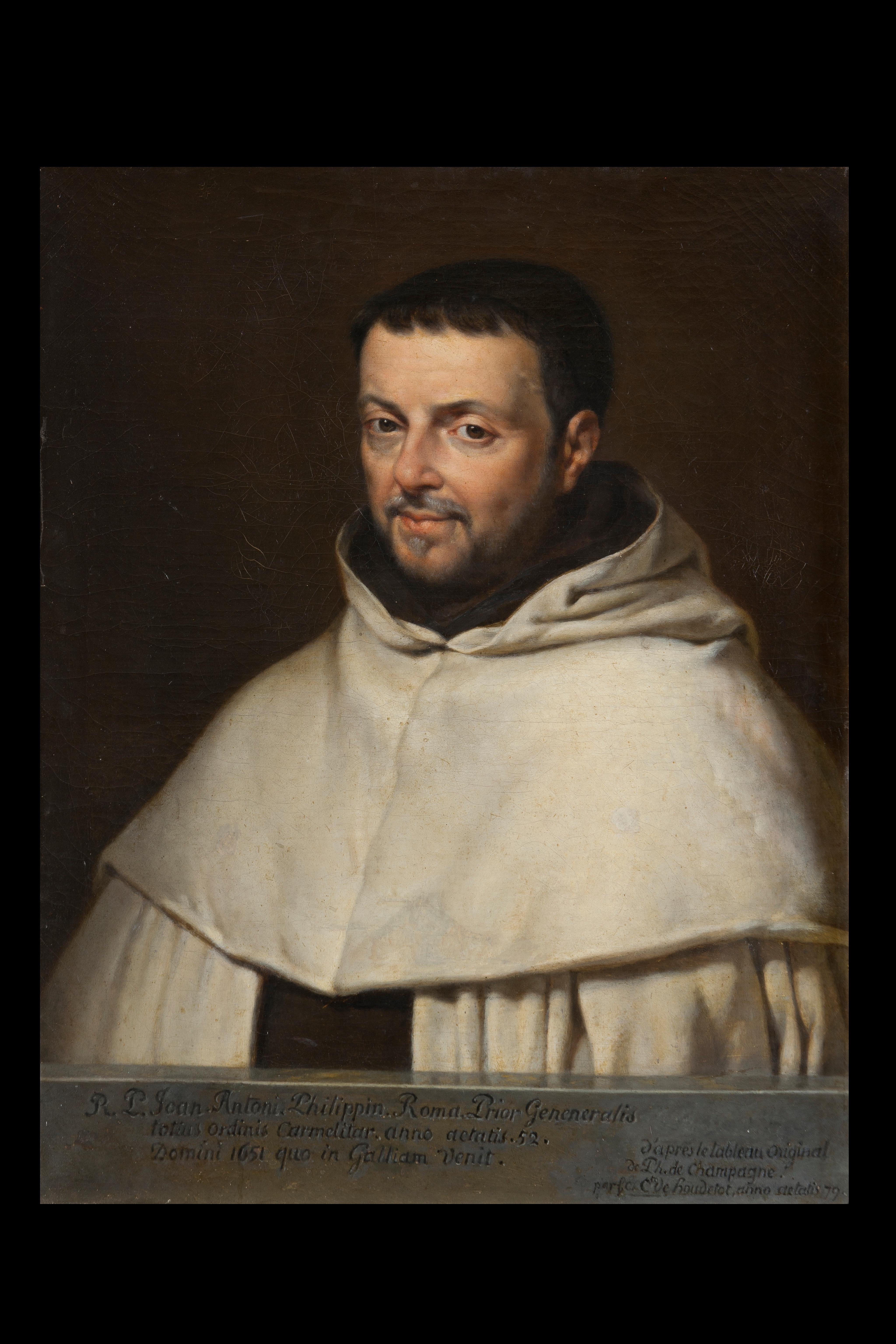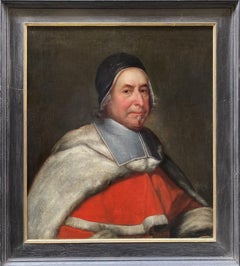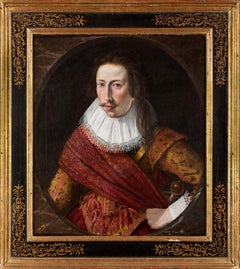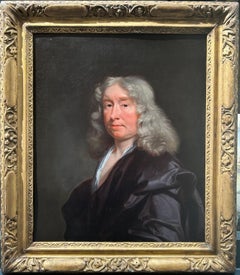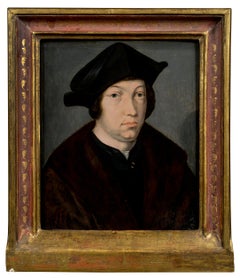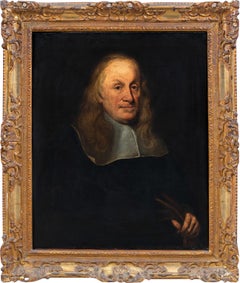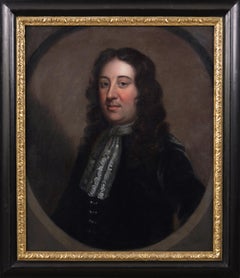Items Similar to PORTRAIT OF WILLIAM WARHAM, Old Masters Oil on Wood
Want more images or videos?
Request additional images or videos from the seller
1 of 7
UnknownPORTRAIT OF WILLIAM WARHAM, Old Masters Oil on Wood
$49,566.43
£36,000
€42,500.29
CA$68,175.75
A$75,830.99
CHF 39,780.83
MX$925,310.31
NOK 499,299.64
SEK 470,529.35
DKK 317,246.66
About the Item
after HANS HOLBEIN THE YOUNGER
1497 – 1543
PORTRAIT OF WILLIAM WARHAM
Oil on canvas
Image size: 38 x 35 inches (89 x 71 cm)
Hand made period style frame
The handling of the paint in this portrait and the overall appearance of the picture suggests that the artist was a talented early seventeenth-century copyist who has faithfully replicated the earlier composition of Hans Holbein the Younger.
The level of detail suggests that the artist had access to both a pattern and the original painting when producing this work.
- Dimensions:Height: 38 in (96.52 cm)Width: 35 in (88.9 cm)
- More Editions & Sizes:1 of 1Price: $49,566
- Medium:
- Movement & Style:
- Period:
- Condition:
- Gallery Location:London, GB
- Reference Number:1stDibs: LU5244690732
About the Seller
5.0
Vetted Professional Seller
Every seller passes strict standards for authenticity and reliability
Established in 2007
1stDibs seller since 2014
82 sales on 1stDibs
Typical response time: 3 hours
- ShippingRetrieving quote...Shipping from: London, United Kingdom
- Return Policy
Authenticity Guarantee
In the unlikely event there’s an issue with an item’s authenticity, contact us within 1 year for a full refund. DetailsMoney-Back Guarantee
If your item is not as described, is damaged in transit, or does not arrive, contact us within 7 days for a full refund. Details24-Hour Cancellation
You have a 24-hour grace period in which to reconsider your purchase, with no questions asked.Vetted Professional Sellers
Our world-class sellers must adhere to strict standards for service and quality, maintaining the integrity of our listings.Price-Match Guarantee
If you find that a seller listed the same item for a lower price elsewhere, we’ll match it.Trusted Global Delivery
Our best-in-class carrier network provides specialized shipping options worldwide, including custom delivery.More From This Seller
View AllPortrait of a Judge, 17th Century English Oil Portrait Painting
Located in London, GB
Oil on canvas, on board
Image size: 30 1/4 x 27 inches (76.75 x 68.5 cm)
Contemporary style handmade frame
This is a attention-holding portrait of a 17th century English judge...
Category
17th Century English School Portrait Paintings
Materials
Oil, Board
Portrait of a Gentleman, 17th Century Dutch Old Masters Oil
Located in London, GB
Circle of Gerard van Honthorst
1592 - 1656
Portrait of a Gentleman
Oil on wooden panel
Image size: 29 x 23 inches
Contemporary gilt frame
Gerard van Honthorst was a Dutch Golden Age...
Category
17th Century Old Masters Portrait Paintings
Materials
Oil, Wood Panel
Portrait of an Officer, Cornelius Johnson, 17th Century Old Masters
By Cornelius Johnson
Located in London, GB
Circle of Cornelius Johnson
Circa 1620’s
Portrait of a Officer
Oil on canvas
Image size: 28 x 24 inches
Period style hand made frame
Provenance
Private European Estate
This striking portrait dates to around 1620, as you can see from the images of the sash the detail is very high. The sash is decorated with gold thread and would have cost a small fortune at the time. Sashes were originally developed for a military function (making officers more visible for their men during combat), but soon became a primarily male fashion...
Category
Early 17th Century Old Masters Portrait Paintings
Materials
Oil
Portrait of William Chiffinch
By John Riley
Located in London, GB
John Riley
1646 – 1691
Portrait of William Chiffinch (c.1602-88)
Oil on canvas
Image size: 30 x 25 inches
Original frame
Another version of this can be found in the Dulwich Pictur...
Category
1680s Old Masters Portrait Paintings
Materials
Oil, Canvas
Portrait of William Herbert, 3rd Earl of Pembroke, Early 17th Century Portrait
Located in London, GB
English School, (circa 1600)
Portrait of William Herbert, 3rd Earl of Pembroke
Oil on panel, oval
Image size: 29¼ x 23⅞ inches
Painted wooden frame
Provenance:
176, Collection of Francis Greville, 1st Earl of Warwick.
The Trustees of the Lord Brooks’ Settlement, (removed from Warwick Castle).
Sotheby’s, London, 22nd March 1968, lot 81.
Painted onto wooden panel, this portrait shows a dark haired gentleman in profile sporting an open white shirt. On top of this garments is a richly detailed black cloak, decorated with gold thread and lined with a sumptuous crimson lining. With the red silk inside it’s all very expensive and would fall under sumptuary laws – so this is a nobleman of high degree.
It’s melancholic air conforms to the contemporary popularity of this very human condition, evident in fashionable poetry and music of the period. In comparison to our own modern prejudices, melancholy was associated with creativity in this period.
This portrait appeared in the earliest described list of pictures of Warwick castle dating to 1762. Compiled by collector and antiquary Sir William Musgrave ‘taken from the information of Lord & Lady Warwick’ (Add. MSS, 5726 fol. 3) is described;
‘8. Earl of Essex – an original by Zuccharo – seen in profile with black hair. Holding a black robe across his breast with his right hand.’
As tempting as it is to imagine that this is a portrait of Robert Devereux, the 2nd Earl Essex, we might take this with a pinch of salt. Its identification with this romantic and fatal Elizabethan might well have been an attempt to add romance to Warwick Castle’s walls. It doesn’t correspond all that well with Essex’s portraits around 1600 after his return from Cadiz. Notably, this picture was presumably hung not too far away from the castle’s two portraits of Queen Elizabeth I. The first, and undoubtedly the best, being the exquisite coronation portrait that was sold by Lord Brooke in the late 1970s and now hangs in the National Portrait Gallery. The second, described as being ‘a copy from the original at Ld Hydes’, has yet to resurface.
The portrait eventually ended up being hung in the State Bedroom of Warwick Castle.
Archival documents present one other interesting candidate. The Greville family’s earliest inventory of paintings, made in 1630 at their home Brooke House in Holborn, London, describes five portraits of identified figures. All five belonged to the courtier, politician and poet Sir Fulke Greville (1554-1628), 1st Baron Brooke, and were hung in the ‘Gallerie’ of Brooke House behind yellow curtains. One of them was described as being of ‘Lord of Pembrooke’, which is likely to have been William Herbert (1580-1630), 3rd Earl of Pembroke. William was the eldest son of Greville’s best friend’s sister Mary Sidney, and was brought up in the particularly literary and poetically orientated household which his mother had supported. Notably, the 3rd Earl was one of the figures that Shakespeare’s first folio was dedicated to in 1623.
The melancholic air to the portrait corresponds to William’s own pretensions as a learned and poetic figure. The richness of the robe in the painting, sporting golden thread and a spotted black fabric, is indicative of wealth beyond that of a simple poet or actor. The portrait’s dating to around the year 1600 might have coincided with William’s father death and his own rise to the Pembroke Earldom. This period of his life too was imbued with personal sadness, as an illicit affair with a Mary Fitton had resulted in a pregnancy and eventual banishment by Elizabeth I to Wilton after a short spell in Fleet Prison. His illegitimate son died shortly after being born. Despite being a close follower of the Earl of Essex, William had side-stepped supporting Devereux in the fatal uprising against the Queen and eventually regained favour at the court of the next monarch James I.
His linen shirt is edged with a delicate border of lace and his black cloak is lined on the inside with sumptuous scarlet and richly decorated on the outside with gold braid and a pattern of embroidered black spots.
Despite the richness of his clothes, William Herbert has been presented in a dishevelled state of semi-undress, his shirt unlaced far down his chest with the ties lying limply over his hand, indicating that he is in a state of distracted detachment. It has been suggested that the fashion for melancholy was rooted in an increase in self-consciousness and introspective reflection during the late 16th and early 17th centuries.
In contemporary literature melancholy was said to be caused by a plenitude of the melancholy humor, one of the four vital humors, which were thought to regulate the functions of the body. An abundance of the melancholia humor was associated with a heightened creativity and intellectual ability and hence melancholy was linked to the notion of genius, as reflected in the work of the Oxford scholar Robert Burton, who in his work ‘The Anatomy of Melancholy’, described the Malcontent as ‘of all others [the]… most witty, [who] causeth many times divine ravishment, and a kind of enthusiamus… which stirreth them up to be excellent Philosophers, Poets and Prophets.’ (R. Burton, The Anatomy of Melancholy, London, 1621 in R. Strong, ‘Elizabethan Malady: Melancholy in Elizabethan and Jacobean Portraits’, Apollo, LXXIX, 1964).
Melancholy was viewed as a highly fashionable affliction under Elizabeth I, and her successor James I, and a dejected demeanour was adopted by wealthy young men, often presenting themselves as scholars or despondent lovers, as reflected in the portraiture and literature from this period. Although the sitter in this portrait is, as yet, unidentified, it seems probable that he was a nobleman with literary or artistic ambitions, following in the same vain as such famous figures as the aristocratic poet and dramatist, Edward de Vere...
Category
Early 17th Century Old Masters Portrait Paintings
Materials
Oil, Wood Panel
Portrait of Ralph William Grey
By Bartholomew Dandridge
Located in London, GB
Provenance
By descent through the sitter's family to
The Collection of R. W. Vivian-Neal of Poundisford Park, Somerset, from whom acquired by
With Lane Fine Art, UK, where purchased by the present owners in 1996
Literature
'Poundisford Park, Somerset' in Country Life, 22 December 1934, ill.
A.W. and C.M. Vivian-Neal, Poundisford Park, Somerset: A catalogue of pictures and furniture, Taunton 1939, cat. nos. 11 and 13
This is a three-quarter-length portrait of Ralph William Grey in a mole-coloured velvet coat and a long waistcoat of green satin, heavily embroidered in gold. Under his left right hand is a black chapeau bras. He has white doe-skin gauntlet gloves.
Son of William and Ann Grey of Backworth: born 19 December 1707. He married Mary the daughter of William Rawstorne of Newall in 1741 and died 5 November 1786. He was educated at Eaton and Trinity College, Oxford.
Within a year of his birth Mrs Grey died and, according to the Country Life article 'From that time forward all Mr Grey's faculties were concentrated on the well-being of his son. The possession of an heir gave zest to his efforts to build up the family fortune: he was successful in most of his ventures. Years later his interest in life was centred in the home of his daughter-in-law and grandchildren'.
Grey's right hand is depicted in the present portrait resting on Locke's Essays and the Country Life article also records that there are constant references to John Locke...
Category
Mid-18th Century English School Portrait Paintings
Materials
Oil
You May Also Like
Portrait of a Man
Located in New York, NY
Provenance:
with Leo Blumenreich and Julius Böhler, Munich, 1924
Dr. Frederic Goldstein Oppenheimer (1881-1963), San Antonio, Texas; by whom given to:
Abraham M. Adler, New York, until 1985; thence by descent to the present owners
While old inscriptions on the verso of this panel propose its author to be Hans Holbein and the sitter Sir John More—a lawyer, judge, and the father of Sir Thomas More—this fine portrait has long been recognized to be by a Flemish hand. Max Friedländer gave the painting to Bernard van Orley (1487/1491 – 1541) in 1924, but did not include it in the volume dedicated to the artist in his Early Netherlandish Paintings...
Category
16th Century Old Masters Portrait Paintings
Materials
Oil, Panel
$52,500
Portrait Noble Man Ceresa Paint Oil on canvas Old master 17th Century Italy Art
Located in Riva del Garda, IT
Carlo Ceresa (San Giovanni Bianco 1609 - Bergamo 1679) attributable
Full-length portrait of Giacomo Pesenti
Oil on canvas (206 x 121 cm - in frame 212 x 133 cm.)
This fascinating portrait, portraying a full-length gentleman and datable to the 17th century, illustrates the stylistic and compositional details typical of the pictorial production of the Lombardy area, Bergamo in particular. This reference is reflected in elements such as the natural light, the sober and austere setting and, above all, the subtle psychological characterisation of the face.
We are inclined to identify the hand of portrait painter Carlo Ceresa, one of the most illustrious Bergamasque figure painters of the 17th century, capable of developing a style of intense realism and acute psychological investigation. In his works, and our portrait perfectly reflects his canons, an extraordinary naturalistic imprint, great realism and remarkable essentiality are evident.
Those traits of severity, moral rigour and austerity typical of his portraiture find a perfect balance here: never courtly or rhetorical, his portraits are profoundly linked to the concept of counter-reform. Immortalising the main personalities of the time, he established himself as a point of reference for the Bergamasque aristocracy, from the Vertova to the Pesenti to the Secco Suardo.
The subject of the portrait is Giacomo Pesenti, here immortalised life-size in a rigorous black suit, his left hand resting on a table, on which is placed the necessities for writing and a manuscript, and his right hand, with a sealed ring on his little finger, abandoned along his side while he holds his gloves.
He wears a suit of incredible rigour, dressed as befits a man of his high social standing, while the sharp light focuses on his face, with an intensity that seems to be accentuated by the reflection of the white collar, with its sharp profile.
For Ceresa, it is not the richness of the garment that gives value to the person portrayed, it is the need to give feeling and bring out the character of the person, and this he succeeds in marvellously, aided by his ability to capture the essence of the person and return it to us in painting through the face and light used as a strong expressive element.
In fact, the image highlights that 'counter-reformed' composure typical of the portraiture of painters active in this area and era, adhering to a verism...
Category
17th Century Old Masters Paintings
Materials
Oil
$12,181 Sale Price
20% Off
Nicolaes Maes workshop (Baroque Dutch)- 17th century figure painting - Portrait
Located in Varmo, IT
Nicolaes Maes (Dordrecht 1634 - Amsterdam 1693) circle of - Portrait of a Gentleman.
81 x 65 cm unframed, 100.5 x 83.5 cm with frame.
Antique oil painting on canvas, in a carved an...
Category
17th Century Old Masters Figurative Paintings
Materials
Oil, Canvas
$7,137 Sale Price
25% Off
17th Century portrait oil painting of a gentleman
By John Riley
Located in Nr Broadway, Worcestershire
Circle of John Riley
British, (1646-1691)
Portrait of a Gentleman
Oil on canvas
Image size: 29 inches x 24 inches
Size including frame: 36 inches x 31 inch...
Category
17th Century Old Masters Portrait Paintings
Materials
Canvas, Oil
Portrait, Classic Art, Original oil Painting, One of a Kind
By Ashot Yan
Located in Granada Hills, CA
Artist: Ashot Yan
Work: Original Oil Painting, Handmade Artwork, One of a Kind
Medium: Oil on Linen,
Year: 2018
Style: Academic Realism,
Subject: Portrait,
Size: 9.5" x 7.5" x 1'' i...
Category
2010s Academic Figurative Paintings
Materials
Canvas, Oil
19th Century By Comte d'Houdetot Portrait of GiovanniAntonioFilippini Oil/canvas
Located in Milano, Lombardia
Frédéric-Christophe, Comte d'Houdetot (Paris, France, 1778 - 1859)
Title: Portrait of Giovanni Antonio Filippini
Medium: Oil on canvas
Dimensions: without frame 72.50 x 42 cm - with ...
Category
19th Century Old Masters Portrait Paintings
Materials
Canvas, Oil
More Ways To Browse
Old Wood Art
Antique Wood Levels
Antique Oil Painting On Wood
Antique Hand Paint Portrait
Old Antique Wood Picture Frames
Clifford Earl
Dolce Gabbana Comic
Emile Wauters
Frans Pourbus
Hunt Slonem Her Majesty
Hunt Slonem Queen
Jacopo Amigoni
Jessie Newbery
Joan Cruspinera
Jocelyn Wildenstein
Lady Mountbatten
Leonie Lebas
Marsha P Johnson
